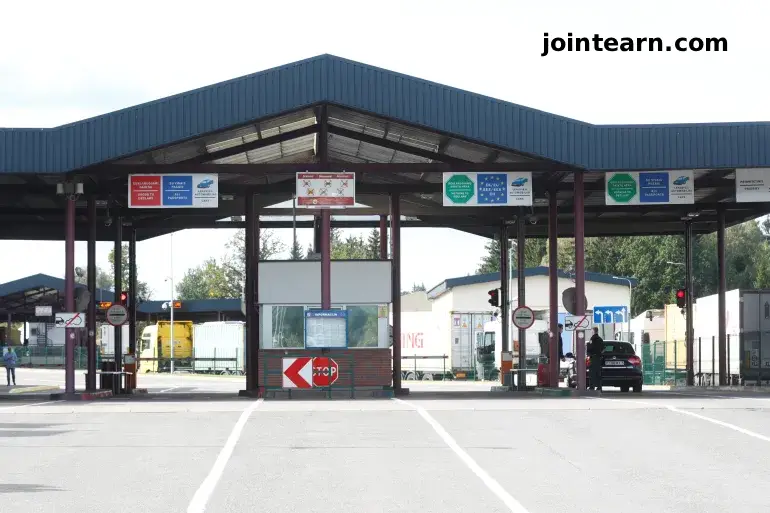
Vilnius accuses Belarus of hybrid warfare after waves of smuggling balloons breach airspace.
VILNIUS, October 29, 2025 — Lithuania has extended the closure of its border with Belarus following a bizarre yet alarming incident in which dozens of balloons carrying contraband cigarettes entered Lithuanian airspace, prompting concerns of hybrid warfare by Minsk.
The Lithuanian government announced Wednesday that it would keep the Salcininkai crossing closed until at least the end of November and restrict traffic at the Medininkai checkpoint, the only other functioning crossing with Belarus. The decision follows several days of escalating tension after the so-called “balloon attack” disrupted civilian air traffic over Vilnius Airport during the weekend.
Interior Minister Vladislav Kondratovic said the restrictions are part of Lithuania’s effort to “send a clear message to our not-so-friendly neighbour.”
“These airspace incursions are not accidental — they are coordinated provocations,” Kondratovic said. “Lithuania will not tolerate acts that threaten our sovereignty and border security.”
Controlled Entry: Who Can Still Cross
Despite the extended closure, Lithuania confirmed that certain categories of travellers will still be allowed entry through Medininkai. These include:
- Lithuanian citizens and residents
- Nationals of the EU and NATO countries and their families
- Holders of valid Lithuanian residence permits
- Individuals with humanitarian visas
Passenger train services between Belarus and Kaliningrad, Russia’s Baltic exclave, will remain operational. Russian citizens transiting to Kaliningrad under existing travel permits will still be permitted to cross at Medininkai, according to Lithuania’s border agency.
Prime Minister Inga Ruginiene said the government could extend or tighten restrictions if the incursions persist.
“We cannot fail to respond to a hybrid attack against Lithuania,” she said. “Our response must show that such provocations will not destabilize our borders or our people.”
Economic and Political Fallout
The border measures will have a ripple effect across both sides of the border. Thousands of Belarusian workers who commute into Lithuania are now stranded, and Lithuanian businesses that still trade with Belarus have warned of serious logistical disruptions.
Lithuania closed two of its six crossings with Belarus earlier this year following intelligence reports of Russian and Belarusian espionage activity, and this latest closure further isolates Belarus from the European Union’s Schengen zone.
Belarus, however, has pushed back hard against Lithuania’s claims.
In a statement, the Belarusian Ministry of Foreign Affairs accused Vilnius of “political theatre” and said Lithuanian officials were using the incident to “cover up their own inability to curb smuggling networks” inside their territory.
President Alexander Lukashenko dismissed the accusations as “a mad scam.”
“If air balloons loaded with cigarettes are flying there, I guess they need to solve the issue on their end,” Lukashenko said. “We’ll apologise if our involvement is proven — but don’t make up fairy tales.”
Lithuania Sees Hybrid Warfare in the Skies
Lithuanian authorities have classified the balloon incursions as part of a hybrid warfare campaign orchestrated by Belarus with Russian backing. Analysts say the operation fits a broader pattern of gray-zone tactics—low-level provocations designed to test NATO’s response.
The incidents come amid a series of drone and airspace violations across the Baltic and Central European regions. NATO officials have reported unprecedented drone activity along the alliance’s eastern border, raising fears that Moscow is probing for weaknesses.
Earlier this week, Belgian Defence Minister Theo Francken confirmed that multiple drones were spotted above a NATO base in Marche-en-Famenne. European defence experts warned the incursions are “testing NATO’s readiness” at a time of growing security tension between Russia and the West.
Regional Security and NATO Implications
Lithuania’s decision to tighten its border underscores its role as a frontline NATO state bordering both Belarus and the Russian exclave of Kaliningrad. The Baltic country has been among the loudest voices urging greater NATO surveillance and air defence measures along the alliance’s eastern flank.
European Union officials said the bloc supports Lithuania’s “right to defend its borders” while emphasizing the need to maintain safe transit for humanitarian and legal travel.
“We recognize the seriousness of Lithuania’s concerns,” an EU spokesperson said in Brussels. “At the same time, EU member states must uphold international commitments and avoid escalation.”
Background: Balloons, Smuggling, and Geopolitics
The so-called balloon attacks began earlier this month when Lithuanian authorities detected several unmanned balloons loaded with cigarette cartons drifting from Belarusian territory. Lithuanian border guards initially dismissed the incidents as smuggling attempts, but later intelligence reports suggested state-level coordination.
The contraband operation disrupted air travel at Vilnius International Airport, forcing temporary closures of runways and triggering emergency airspace alerts. Lithuanian officials have since labelled the incident a “hybrid threat combining smuggling, espionage, and airspace violations.”
What Happens Next
As the standoff intensifies, analysts warn that the incident could further strain EU-Belarus relations, already frozen since Minsk supported Russia’s full-scale invasion of Ukraine.
Lithuania’s security services continue to monitor airspace for additional incursions, while NATO’s Baltic Air Policing mission has stepped up patrols.
“Every balloon, every drone, every breach — it’s all part of the same message,” said a senior Lithuanian intelligence official. “They’re testing our resolve. We must show them it won’t work.”


Leave a Reply